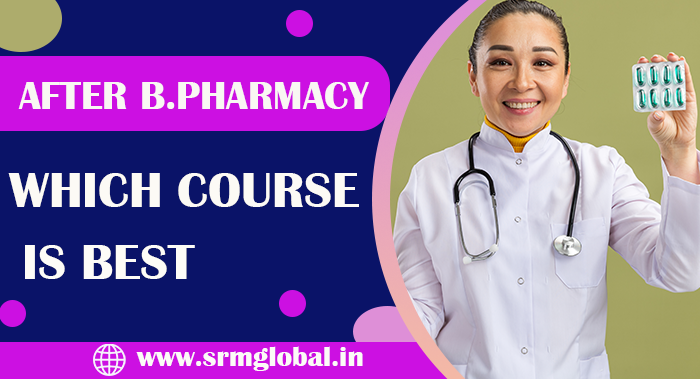
Arrange a Callback
After B.Pharmacy which course is best ?
Graduating with a Bachelor of Pharmacy (B Pharmacy) opens up a world of opportunities in the healthcare and pharmaceutical industries. However, many students find themselves at a crossroads, wondering what the best next step is to ensure a fruitful and successful career. Whether you are aiming to enhance your knowledge, specialize in a niche area, or improve your job prospects, choosing the right course after B Pharmacy is crucial. This article will delve into some of the best courses to consider after completing your B Pharmacy, with a special focus on opportunities available through B Pharmacy college in Haryana and the broader South Asian region.
1. Master of Pharmacy (M.Pharm)
One of the most straightforward paths after B Pharmacy is pursuing a Master of Pharmacy (M.Pharm). This postgraduate course allows you to specialize in various fields such as Pharmacology, Pharmaceutics, Pharmaceutical Chemistry, and Pharmacognosy. An M.Pharm degree from a reputed B Pharmacy college in Haryana can greatly enhance your practical and theoretical knowledge, making you more competitive in the job market. Additionally, it qualifies you for roles in research and development, quality control, and academic positions.
Why To Choose M.Pharm?
- Specialization: M.Pharm programs allow you to specialize in a specific area of pharmacy such as pharmaceutics, pharmacology, pharmacognosy, pharmaceutical chemistry, or pharmaceutical analysis. This specialization provides in-depth knowledge and expertise in your chosen field, making you more competitive in the job market.
- Career Advancement: With a master’s degree, you may have access to higher-level positions within the pharmaceutical industry, academia, research institutions, or regulatory agencies. Many advanced roles, such as research scientist, clinical pharmacist, or regulatory affairs specialist, require or prefer candidates with a master’s degree.
- Research Opportunities: M.Pharm programs often include research components where students engage in hands-on research projects under the guidance of experienced faculty members. This experience can be valuable if you’re interested in pursuing a career in pharmaceutical research, drug discovery, or academia.
- Industry Connections: M.Pharm programs often have strong ties to the pharmaceutical industry, with faculty members who are actively engaged in research collaborations, consulting projects, and industry partnerships. Students benefit from exposure to industry professionals, guest lectures, networking opportunities, and internship or co-op experiences, which can enhance their career prospects and industry insights.
2. Master of Business Administration (MBA) in Pharmaceutical Management
For those who wish to combine their pharmaceutical expertise with business acumen, an MBA in Pharmaceutical Management is an excellent choice. This course equips you with the knowledge and skills needed to manage and lead pharmaceutical companies. It’s ideal for graduates looking to move into managerial roles or start their own ventures. MBA programs offered by esteemed institutions in Haryana provide comprehensive training in management principles, finance, marketing, and strategic planning tailored to the pharmaceutical industry.
Why To Choose MBA In Pharmaceutical Management?
- Industry Specific Knowledge: An MBA in Pharmaceutical Management provides you with specialized knowledge of the pharmaceutical industry, including its unique challenges, regulations, and market dynamics. This specialized understanding can be highly valuable when seeking leadership roles within pharmaceutical companies or related organizations.
- Business Skills: MBA programs typically cover a broad range of business disciplines such as finance, marketing, operations, and strategic management. These skills are essential for success in managerial and executive positions within the pharmaceutical sector, where business acumen is highly valued alongside scientific expertise.
- Career Advancement: A specialized MBA can open up new career opportunities and accelerate your career progression within the pharmaceutical industry. With the combination of business skills and industry-specific knowledge gained through the program, you may qualify for leadership roles such as pharmaceutical product manager, marketing director, regulatory affairs manager, or strategic planner.
- Industry Networking: MBA programs often provide opportunities for students to network with industry professionals, alumni, and faculty members through guest lectures, networking events, and industry partnerships. Building a strong professional network can facilitate career advancement, job opportunities, and collaboration within the pharmaceutical industry.
3. Clinical Research Courses
Clinical research is a rapidly growing field with a high demand for skilled professionals. Postgraduate courses in Clinical Research provide in-depth knowledge about clinical trials, regulatory affairs, and biostatistics. These courses are essential for those looking to contribute to the development of new drugs and therapies. Pharmacy graduates from colleges in Haryana can benefit from specialized training that equips them for roles such as Clinical Research Associate (CRA), Clinical Data Manager, and Regulatory Affairs Specialist.
Why To Choose Clinical Research Courses?
- Career Opportunities: Clinical research is a rapidly growing field, driven by the need for new drugs, medical devices, and therapies. Completing clinical research courses can open up diverse career opportunities in pharmaceutical companies, contract research organizations (CROs), academic institutions, regulatory agencies, and healthcare settings.
- Industry Demand: There is a high demand for skilled professionals in clinical research due to the increasing complexity of clinical trials, stringent regulatory requirements, and the globalization of clinical research activities. By acquiring knowledge and skills in clinical research, you position yourself as a valuable asset in the job market.
- Contribution to Healthcare: Clinical research plays a crucial role in advancing medical knowledge, improving patient care, and developing new treatments for various diseases and medical conditions. By participating in clinical research or working in the field, you contribute to the development of safe and effective therapies that benefit patients worldwide.
- Hands-On Experience: Many clinical research courses offer hands-on training and practical experience in conducting clinical trials and research studies. This experiential learning helps students develop essential skills in protocol development, data collection, analysis, and interpretation, preparing them for real-world research settings.
4. Drug Regulatory Affairs
A postgraduate diploma or certification in Drug Regulatory Affairs is another excellent option. This course focuses on the laws and regulations governing the pharmaceutical industry, ensuring that new drugs are safe and effective. Professionals in this field are responsible for obtaining approval from regulatory bodies for new products. With stringent regulatory norms worldwide, specialists in this area are in high demand.
Why To Choose Drug Regulatory Affairs?
- Contribution to Public Health: Regulatory affairs professionals play a crucial role in ensuring the safety, efficacy, and quality of pharmaceutical products. By ensuring compliance with regulatory requirements, they contribute to protecting public health and safety.
- Dynamic and Evolving Field: Drug regulatory landscape is constantly evolving due to advancements in science, changes in regulations, and emerging global challenges. This offers opportunities for professionals in regulatory affairs to continually learn and adapt to new requirements and standards.
- Global Opportunities: Drug regulatory affairs professionals are in demand worldwide. As pharmaceutical companies expand their operations globally, there is a growing need for professionals who understand international regulatory requirements and can navigate the complexities of regulatory submissions and approvals in different regions.
- Career Opportunities: Choosing drug regulatory affairs opens up diverse career opportunities in the pharmaceutical industry, regulatory agencies, consulting firms, and other healthcare organizations. Regulatory professionals are in high demand due to the increasing complexity of regulatory requirements and the growing need for expertise in drug development and compliance
5. Pharmacovigilance
Pharmacovigilance is the science of detecting, assessing, and preventing adverse effects of pharmaceutical products. Courses in this field are designed to train professionals to monitor and evaluate the safety of drugs. Given the increasing focus on drug safety, there is a growing need for qualified pharmacovigilance professionals.
Why To Choose Pharmacovigilance?
- Impact on Public Health: Pharmacovigilance professionals play a crucial role in monitoring and assessing the safety of pharmaceutical products. By identifying and evaluating adverse drug reactions and ensuring the safe use of medications, they contribute directly to public health and patient safety.
- Global Demand: With the increasing complexity of drug development and regulatory requirements, there is a growing demand for pharmacovigilance professionals worldwide. This creates diverse job opportunities in pharmaceutical companies, contract research organizations (CROs), regulatory agencies, and healthcare institutions.
- Interdisciplinary Nature: Pharmacovigilance involves collaboration with various stakeholders, including healthcare professionals, regulatory authorities, pharmaceutical companies, and patients. This interdisciplinary nature allows professionals to work in diverse teams and gain insights from different perspectives, enhancing their skills and knowledge base.
- Medical Knowledge Expansion: Pharmacovigilance generates valuable data on the safety of medications, which contributes to medical knowledge and scientific research. By analyzing ADR reports and conducting pharmacovigilance studies, researchers can better understand the mechanisms of drug toxicity, identify risk factors for adverse events, and improve drug development processes.
Conclusion
In conclusion, determining the best course to pursue after completing a Bachelor of Pharmacy (B.Pharm) hinges on individual career aspirations, interests, and the evolving landscape of the pharmaceutical and healthcare sectors. While options abound, each with its unique merits, candidates should consider factors such as specialization opportunities, market demand, and personal goals. Whether opting for a Master of Pharmacy (M.Pharm) to deepen pharmaceutical knowledge, pursuing an MBA in Pharmaceutical Management for a blend of business acumen and industry expertise, or venturing into fields like clinical research, regulatory affairs, or public health, the choice ultimately rests on aligning educational pursuits with long-term career objectives.


